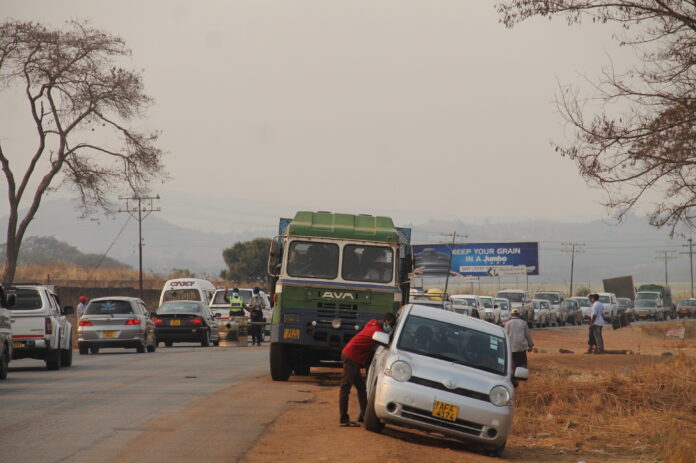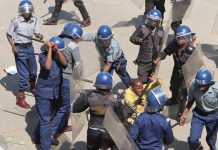
Sydney Kawadza
Police in Zimbabwe are continuously engaged in cat and mouse chases with an extremely complacent population which continues to defy lockdown measures imposed to curtail the spread of the deadly COVID-19 virus.
Government has banned various activities including inter-city travel although people continue to defy the order and risking the chance of contracting the virus.
This is happening when police on Tuesday impounded 50 buses carrying passengers for inter-city travel despite the ban.
Police figures also indicate that more than 100 busses have been impounded for violating the cross country and inter-city travel bans.
Medical and health professional have also expressed their exasperation over the continued laxity among ordinary Zimbabweans to comply with basic WHO guidelines on COVID-19 and government lockdown restrictions.
This also comes after authorities have announced the emerging C.1.2 coronavirus strain in South Africa.
Announcing the Level 4 National Lockdown in June this year, President Mnangagwa imposed dusk to dawn curfew, banned inter-city travel and cut business hours in response to increasing coronavirus infections.
Businesses were ordered to open between 8 a.m. and 3 p.m. while a curfew would start from 6:30 pm to 6 am with companies required to only have 40 percent of their workforce.
The measures have been reviewed on a fortnightly basis with the lockdown restrictions remaining in force.
President Mnangagwa also noted with concern the continued flouting of the restrictions with people traveling during the night to evade arrest.
Travellers have also become daring while pirate taxis and long distance haulage trucks aiding the illegal travels.
Long distance buses have also joined the fray after government last week permitted inter-city travel as schools opened this week.
In an interview, ZRP national spokesperson Assistant Commissioner Paul Nyati said police had impounded 51 buses that were carrying people to other cities despite the ban.
“We have impounded 32 buses at Mbare Musika as the crews were taking advantage of the announcement that inter-city travel was allowed but for those accompanying children to their schools.
“We have also impounded another nine buses in Matabeleland North for the same offence. What we would want to do is to urge all people to comply with government directive to stay in their cities and towns.
“Anyone defying this government directive would be arrested.”
It has, however emerged, during a month long investigation that inter-city travel never stopped despite the government ban.
The investigation, funded by the National Geographic Society, also revealed that travellers have to endure escalated charges to travel during the lockdown period.
Travellers going to Bulawayo have been forced to fork-out US$20 for a journey that normally costs half that amount with others going for 100km journey to Chinhoyi paying an inflated US$5 or US$6 for a single journey.
Pirate taxi drivers using the Bindura-Harare Highway have also devised ways of beating the police by exchanging passengers before roadblocks.
“We have no choice but to find ways to save the money we make on the road. If my colleague is in Bindura, we will meet in Mazowe where the police are strict.
“I can try and pay a bribe for one roadblock but going further than that roadblock means I will lose more money to the corrupt police on the road,” a pirate taxi driver said during the investigation.
The Harare-Chirundu Highway is one of the busiest in Zimbabwe with haulage trucks moving through Zimbabwe from South Africa, Zambia, Mozambique and Botswana.
Truck drivers have also developed a way of hiding passengers who are usually crammed in the truck cabins to evade police on several roadblocks.
A truck can carry more than 14 passengers without police detection.
A truck driver from Mozambique and was transporting chrome from Kildonan Siding in Mutorashanga also narrated how they evade police roadblocks.
“I just have to make sure that my passengers are not visible to the prying eyes of the police. The biggest challenge for us foreign is not the fines but the bribes I have to pay when I am caught with the passengers,” he said.
Bulawayo’s Mpilo Central Hospital acting chief executive Professor Solwayo Ngwenya bemoaned the people’s continued defying of laid down basic lockdown regulations and restrictions and basic WHO protocols including the intercity travel ban.
“I have personally seen people attending funerals so the population is gone back to its complete complacency and as the Third Wave is wearing off, we are going to experience more extreme complacency setting in.
“This is at a wrong time as a new variant is erupting in South Africa, the C.1.2 variant. This one is likely to have a huge impact in the way how the carnage of the coronavirus is going to play among the people,” he said.
He said chances of the variant reaching Zimbabwe were extremely high considering its geological connection to South Africa.
The variant has been detected in all South African provinces including Gauteng were most of the travelling Zimbabweans are found.
“These people who travel to Zimbabwe take about 10 hours to reach Harare or Bulawayo. This variant is probably in Zimbabwe although at low levels and as the population mixes and mingles, this C.1.2 variant will erupt again probably as a harbinger of the forth wave,” he said.
The C.1.2 strain is being described as highly transmissible and even worse than the Delta variant which causes a huge carnage in the July/August death rate.
The deadliest COVID-19 strain to date, according to the World Health Organisation, has been the Delta variant, first identified in India in October 2020.
The variant has now been detected in more than 100 countries, and has been virulent in countries with both low and high vaccination coverage.
Delta was designated as a variant of concern (VOC) in May this year while other VOCs are alpha, beta and gamma.
Like all viruses, the SARS-CoV-2 coronavirus is evolving and sometimes, new variants emerge and then disappear. Variations often allow viruses to spread more easily and.
Professor Ngwenya said there was need for authoritie and health experts to plan on how to shepherd the population out of the quagmire.
“We are seeing a population that seems not to understand the implications of a pandemic. As I said before, the last major pandemic was in 1918 and many people don’t have a clue of what a pandemic is.
“These new and terrible variants like the C.1.2 have been known to be far different from the first strain detected in Wuhan, China in 2019.
“This means the virus has changed and it will latch on to the people and get transmitted very quickly from one person to another within a short period of time”
He called on people to continue wearing their face masks properly, covering both the nose and mouth, wash or regularly sanitize their hands and avoid unnecessary gatherings.
Zimbabwe has recorded 124 581 COVID-19 cases which have led to 4 416 deaths.
Government has, however, stepped its vaccination programme with more than four million people being vaccinated.
A total of 2 552 573 people had received their first dose of the vaccines while a further 1 619 463 received their second doses as of August 30, 2021.
Zimbabwe is targeting to vaccinate 10 million people to reach herd immunity by December this year.
- This project was funded by the National Geographic Society














